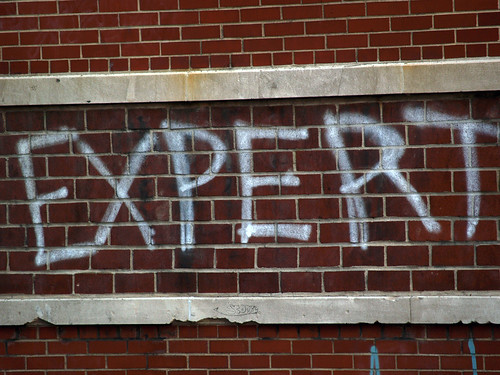 This past week, a friend asked me to lend my expertise on charity fundraising, based on my long-time participation in the Pan-Mass Challenge to fight cancer. While she didn’t use the word “expert,” a call for advice reeks of leaning on someone for “expertise.” I don’t consider myself an expert in charity fundraising – there are many people who raise more money for that event than I do. But here’s the thing. I have done it. I had some real, practical advice on what has succeeded, what hasn’t and things I have thought about trying – but haven’t – that my friend might consider. That’s real “expertise” – something, based on experience, that others can use.
This past week, a friend asked me to lend my expertise on charity fundraising, based on my long-time participation in the Pan-Mass Challenge to fight cancer. While she didn’t use the word “expert,” a call for advice reeks of leaning on someone for “expertise.” I don’t consider myself an expert in charity fundraising – there are many people who raise more money for that event than I do. But here’s the thing. I have done it. I had some real, practical advice on what has succeeded, what hasn’t and things I have thought about trying – but haven’t – that my friend might consider. That’s real “expertise” – something, based on experience, that others can use.
There is a lot of pressure on people in the consulting industries to be considered “experts.” The problem with that is it either encourages people to stumble outside their real area of expertise, or it forces people who would rather not lead with their ego to call themselves such against their will, even if the credentials are in place. I address the latter in the first paragraph; you can relate expertise without placing yourself above others.
In early blogging days when I was more prone to write these “how you blog” navel-gazing posts, I might write something about swallowing self-doubt and plunging in the deep end with the rest of the self-professed. Another thing: attending conferences over the last several years, I have seen a reliance on the “experts” as speakers; these people may have real-world experience, or they may be “professional speakers” far removed from what got them there – and what you need to move forward. I’m still for marshaling the confidence to show your skills, but am more likely to temper that with a “show me” request. Don’t rely on opinions, tell us about your experience.
Back to the conferences: what I crave when I go to conferences are case studies – research, too. What I really want is real world information and to hear how people are doing things and how they solved problems. What’s the state of (in my case) social media in your industry? Tell me what you did. The generic “motivational” speaking (and of course, pushing the latest book you’ve written) isn’t doing it for me any more.
How do you use experience to show true expertise? I keep these things in mind:
- Experience: As stated above, base what you say on what you did – what worked, what didn’t, as well as the roads you didn’t travel and why.
- Trust: I don’t trust merely on name recognition and perceived celebrity. I want your calling card to be accomplishment. You didn’t have to start a social media program at a Fortune 500 company from scratch, but just show me what you did and how you did it.
- Humility: I’m not saying you shouldn’t tout your accomplishments or not say you are great at what you do. I’m just saying that it’s important to be relatable. Don’t be a celebrity, even if it’s among your co-workers, your community, or your industry colleagues. Be a resource, and also put your ego aside and be willing to her counter-arguments (Note: I’m not talking about false humility; if you use the term “humblebrag” I’ll probably tune you out as there is no such thing).
- Willingness to Help: Your reputation as someone with expertise or experience is measured by how much you use it to help others. Lend an ear, donate time, teach a class, go out for that coffee. People deserve your help just as much as you deserved that of others.
Now go ask someone for their expertise – or give yours.
But before you do, tell me what you think. What are your thoughts on experts and experience?
![]() My pal Doug Haslam works with the PN Connect team at Voce Communications, a Porter Novelli Company, running social media publishing programs for companies both large and small. He not only has two decades of broadcasting, PR, marketing and social media experience, he’s one of the funniest people on the planet. I’m so lucky to call him “friend.” (Among other things). You can find him online at @dough, stalk his blog or connect with him on LinkedIn. I strongly suggest you do.
My pal Doug Haslam works with the PN Connect team at Voce Communications, a Porter Novelli Company, running social media publishing programs for companies both large and small. He not only has two decades of broadcasting, PR, marketing and social media experience, he’s one of the funniest people on the planet. I’m so lucky to call him “friend.” (Among other things). You can find him online at @dough, stalk his blog or connect with him on LinkedIn. I strongly suggest you do.